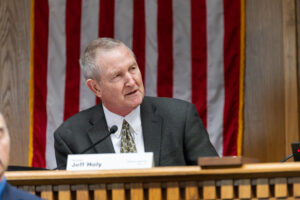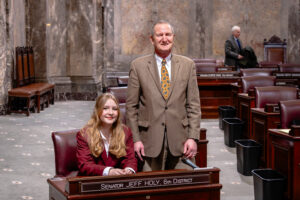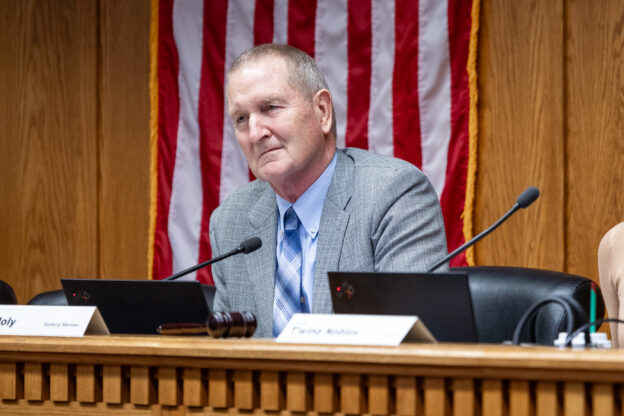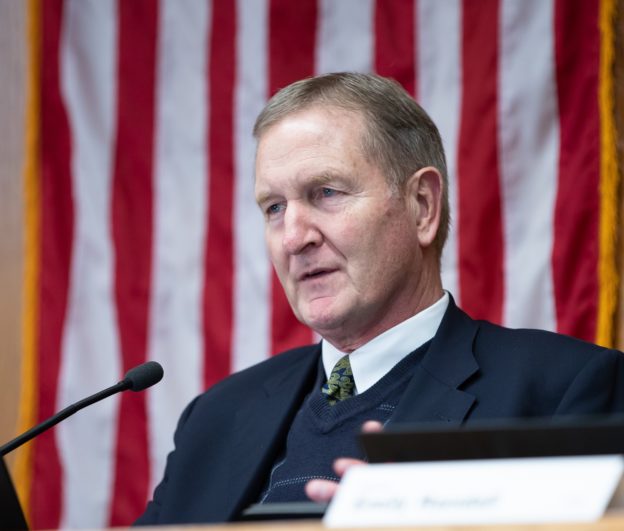January 29, 2025
Dear Friends and Neighbors,
Greetings from Olympia, where the Legislature is in its third week of this year’s 105-day session.
During this “long” session, the Legislature’s main responsibility will be to develop and approve new two-year state operating, capital and transportation budgets. However, those budget proposals won’t be released by the House and Senate until later in the session, which ends April 27.
The first week of the session featured many long-standing traditions. The opening day, January 13, included swearing-in ceremonies for new and reelected senators. A day later, outgoing Governor Jay Inslee gave his final State of the State Address to a joint session of the Legislature.
One day after Inslee’s last speech as governor, new Governor Bob Ferguson delivered his inaugural address before another joint gathering. Contrary to Inslee’s speech, Ferguson’s address was generally well-received on both sides of the aisle. In fact, he mentioned me during his speech, touting a bill I’ve advocated for years that would help make Washington communities safer by adding more law-enforcement officers. (More about that later.)
Once the ceremonies and speeches were behind us, my fellow legislators and I got down to business. The Senate has 12 policy committees and two fiscal committees, each focused on specific policy areas. This phase of the session has us spending much of our time in committee meetings, holding public hearings on Senate bills that have been sent to these panels.
We will be in this committee phase until late February, with Senate policy committees having a February 21 deadline to pass Senate bills, while the Senate fiscal committees (Transportation, and Ways and Means) have until February 28 to approve Senate bills.
When we’re not in committee meetings, we typically are meeting with constituents, other legislators and staff. We have yet to spend much time on the “floor” of the Senate chamber; that will happen far more often later, when we debate and vote on bills that were passed by Senate committees.
Senator Holy discusses a bill during a Law and Justice Committee meeting.
My Senate committee assignments
I am serving on three Senate committees this session. I was appointed Republican leader on the Senate Law and Justice Committee, and I’m continuing to serve on the Senate’s Health and Long-Term Care, and Transportation committees.
Senate committee passes Holy bill to hire more law-enforcement officers
Washington ranks among the worst states in several categories, including murders, auto theft and retail theft. A key reason is that we also rank 51st nationally – dead last – for the number of law-enforcement officers per capita. As a retired police officer, I know we need more officers in our communities and on our roads.
That is why I have re-introduced a bipartisan bill this year to improve public safety by increasing the number of law-enforcement officers in Washington communities.
Senate Bill 5060 would have the state Criminal Justice Training Commission develop and implement a grant program to help local and tribal governments hire law-enforcement officers. A $100 million appropriation from the state general fund would support the grant program.
SB 5060 also would require the CJTC to establish policies for grant applications from local agencies, including review criteria and reporting requirements from local governments, and annually report on the grant program’s utilization, application and hiring data.
The bill was passed last week by the Senate Law and Justice Committee. It now is before the Senate Ways and Means Committee. Before approving the measure, the Law and Justice Committee adopted an amendment offered by Senator Manka Dhingra, the committee chair.
I’ve introduced this bill in past sessions only to see it fall short, but I am more optimistic this time around – because during his inaugural address to legislators early this session, Governor Ferguson said he would not sign a new operating budget if it did not provide the $100 million in funding for this program. It is encouraging that he has publicly supported this bill, as his predecessor would not. The governor not only understands the need to increase the number of law-enforcement officers in our state but he also believes the best route is through this proposed grant program.
Another of my bills to increase public safety is Senate Bill 5285. It would create a revenue source to hire more law-enforcement officers.
Other 2025 bills introduced by Senator Holy
- Senate Bill 5286 would establish a community partnership program between the Department of Social and Health Services and the city of Medical Lake to support community policing efforts at and near Eastern State Hospital. It received a public hearing in the Senate Law and Justice Committee on Tuesday.
- Senate Bill 5306 would make a change to the Law Enforcement Officer and Firefighter System Plan 2 (LEOFF 2) helpful to members who go on an authorized leave of absence – an example being military duty – that could affect their service credit. The Senate Ways and Means Committee held a public hearing on the bill last week.
Senator Holy with Lainey Tillman, who served as a Senate page during the 2024 legislative session.
Looking for Senate page applicants!
If you know a teenager who would like to spend a week in Olympia working at the Capitol, let them know about the Senate Page Program. Applications are still being taken. The application form is here. As a state senator, I can sponsor several Senate pages during the legislative session, so I encourage interested teens to apply for this fun and interesting experience.
Senate pages help senators and their offices and deliver messages to members on the Senate floor. Pages attend and participate in Page School, where they learn more about how the Legislature works. Pages earn a stipend of $65 a day and can earn up to 20 hours of community service.
Pages must be 14 to 16 years old at the time they participate in the program, and they must attend a school in Washington or be homeschooled in our state. To be a page, students must receive approval and recommendation from their teacher and principal. (This requirement is waived for homeschooled students.)
The page program is a great way for Washington teens to see the Legislature in action and to meet other students from around the state.
For more information about the Senate Page Program, please go here. You can also email the page program at SenatePageProgram@leg.wa.gov if you have questions.
Let me know if I can help
If you have any questions, or have a problem with a state agency and need help resolving it, please contact me. You can email me at jeff.holy@leg.wa.gov or call my office at 360-786-7610.
Thank you for the opportunity to serve as your 6th District state senator.
Sincerely,



















